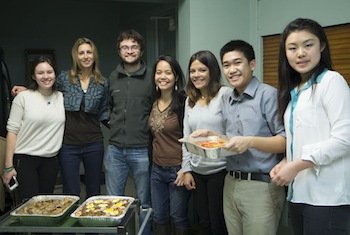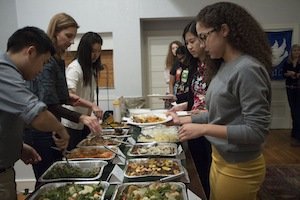Hope After Haiyan Dinner Raises Money by Celebrating Filipino Culture

Although the global media coverage of Typhoon Haiyan has decreased, the Philippines continues to face the immense task of rebuilding its infrastructure, revitalizing its communities, and restoring morale amongst the Filipino people and in the world. The natural disaster, which hit last November, left over 6000 dead, thousands missing, and a devastated Philippines in its wake.
In response to such devastation, Swarthmore i20, Swarthmore's international student group, and the Student Activities Office, with the help of International Students and Scholars Advisor Jennifer Gold, co-sponsored an event, "Hope After Haiyan: A Filipino Fundraiser Dinner." The dinner was held earlier this week at the Friends Meeting House.
Maki Somosot '12, the lead organizer of the event, says that the idea sprang from her own deep personal tie to the Philippines and her love for Filipino cuisine.
"When Haiyan struck the country in early November last year, I felt incredibly helpless and powerless being so far away," she says. Somosot's extended family still lives in the Philippines and she was faced with the very real possibility that their provinces and homes could have been struck by the disaster. This realization spurred her into action.

The dinner, which served to support long-term rebuilding in the Philippines, featured a variety of traditional Filipino dishes and deserts, including adobo (meat marinated in seasonings and vinegar, the unofficial dish of the Philippines), lumpiang shanghai (spring rolls), bistek Tagalog (the Filipino version of beef steak), and palabok (a rice noodle dish). In keeping with Filipino dining traditions, attendees were encouraged to eat with their hands, or, kamayan-style. Somosot says that she chose to promote Filipino food "because it looks like it's finally coming into its own as a mainstream cuisine." In addition to promoting a good cause, Somosot wanted to spread the excitement of Filipino cuisine to Swarthmore - a campus she says "has always been very open to different cultural experiences and trying new things."
Proceeds from the event were split between Dakila, a Filipino youth advocacy and empowerment group, and Operation Airdrop, a voluntary helicopter operations team that delivers relief goods in isolated villages. Both groups are focusing on affected provinces that haven't received as much media attention as other parts of central Philippines.
The event, however, did not merely focus on raising money for the reconstruction effort.
"The event also served to show people the 'kababayan spirit' of the Filipino people, the sense of unity that Filipinos worldwide share," says Delfin Buyco '17 from Renton, Wash. Buyco, whose family is from the Visayan region, says that the event highlighted the joint relief effort of those in the Philippines and Filipino-Americans in the states. Both Buyco and Somosot stress that they wished to spread awareness to the Swarthmore community. They wish to remind people that there is still a lot of work that needs to be done on the ground.
"Even though media attention has already shifted away from the disaster, there are still so many people in the middle of rebuilding their lives who continue to seek help. It is the long term response that will ultimately have the greatest impact," says Somosot.


